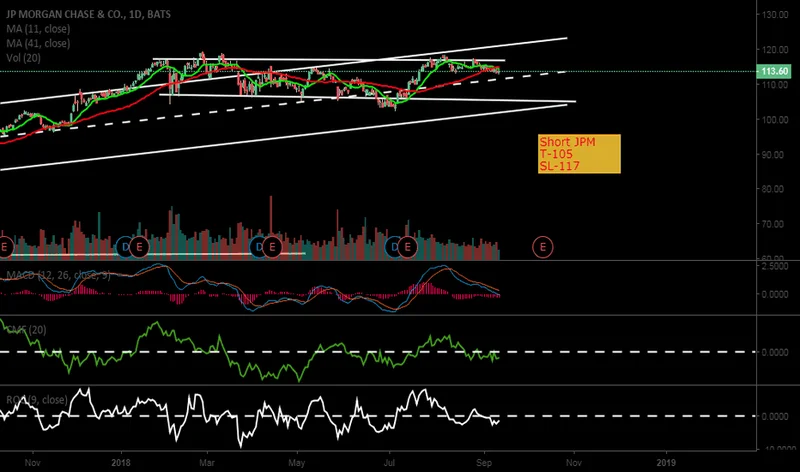The JPMorgan Earnings Charade: Why a 'Win' Still Looks Like a Loss
You gotta love Wall Street. Seriously. It’s the only place on Earth where you can sprint across the finish line, smash the record, and have the crowd start booing you. That’s exactly what we saw with JPMorgan Chase this week. The pinstriped suits in their glass towers popped the champagne, announcing they’d beaten earnings estimates. Their prize? A swift kick in the stock price.
The numbers look good on paper, I guess. If you’re into that sort of thing. They posted an earnings per share of $5.07, sailing past the $4.85 the Wall Street fortune tellers predicted. That’s a 16% jump from last year. Sixteen percent! In an economy where a carton of eggs costs more than a movie ticket, a banking Goliath is padding its bottom line by a cool sixteen percent.
And the market’s reaction was to dump the stock.
This isn’t just a weird blip on the radar. This is the market, for one brief, honest moment, acting like that one friend who's had too much to drink at a party and starts telling everyone the truth. While the corporate PR team is handing out neatly printed press releases, the market stumbles over and slurs, “Yeah, but… I don’t believe a word of it.” And that, right there, is the only story that actually matters.
The Most Expensive Theater in the World
Let's be real about what an "earnings beat" actually is. It’s a carefully choreographed game, a piece of corporate theater. The company whispers guidance, the analysts set a low bar, and then—ta-da!—the company heroically leaps over it. We’re all supposed to stand up and applaud the performance. It's like a magician telling you he's going to pull a rabbit from a hat, and you feign shock when a fluffy bunny appears. We all knew it was coming.
The beat itself is meaningless. It’s the illusion of success, not success itself. The real metric, the one that can’t be spun or massaged, is how the collective hive-mind of investors reacts. And on Tuesday, they reacted with a resounding "meh." They saw the confetti and the victory lap and decided to head for the exits anyway.

Why? What did they see that the rest of us were supposed to ignore? We don’t have the full picture, offcourse, because these reports are designed to be as dense as a physics textbook. But the market’s gut reaction points to a deep-seated anxiety. It’s a vote of no confidence, not in the quarter’s numbers, but in the future those numbers are supposed to promise. It’s like getting a perfect report card from a student who you know has been cheating. The grades are great, but you have zero faith in their ability to pass the final exam. This ain't a sign of strength; it's a sign that the foundation is cracking.
I can just picture the scene inside JPM headquarters. A bunch of executives in a silent, mahogany-paneled room, staring at a giant screen. The green "EPS BEAT" banner is flashing, but right next to it, the JPM ticker is a bloody red arrow pointing down. The smell of stale coffee and expensive cologne hangs in the air as they try to figure out why the script they wrote isn't playing out the way it was supposed to.
A 16% Jump Into What, Exactly?
So JPM’s profits are up 16% from last year. Fantastic. I’m thrilled for them. But I have to ask the stupid question: where did that money come from? Is our economy really 16% more productive, 16% more innovative, 16% more robust than it was a year ago? Are small businesses thriving? Is your paycheck 16% bigger?
Or—and hear me out—did a financial behemoth just get 16% better at extracting wealth from a system that’s already running on fumes? This growth is impressive. No, "impressive" doesn't cover it—this is the kind of efficiency that should make you nervous. It feels less like a company building something new and more like a finely tuned machine getting better at harvesting what’s already there.
It’s the financial equivalent of those self-checkout machines replacing cashiers. I was at the grocery store the other day and got stuck behind someone trying to buy alcohol, and the damn machine just froze, blinking its red light of shame, waiting for the one overworked employee to come and verify a driver's license. It’s progress, I guess, but it feels hollow and deeply annoying. Is that what this 16% is? Just a more efficient way to make our lives more complicated with fees and financial products nobody asked for?
They want us to celebrate this, to cheer for the numbers on a screen while our own bank accounts... well, you know. They expect us to see that 16% and think, "Wow, the system is working!" But what if it’s a sign the system is working exactly as designed—for them, and not for anyone else? Maybe I'm the crazy one here, but a banking giant getting richer while everything else feels like it's getting harder doesn't strike me as a victory. It feels like a warning.
So We're All Just Pretending, Then?
At the end of the day, this whole episode is just another crack in the facade. JPMorgan won the little game it set up for itself, and the prize was a glimpse of the market’s true feelings: fear. The numbers in the press release were backward-looking, a snapshot of a past that’s already gone. The stock price, however, is a bet on the future. And right now, the house is betting that the future doesn’t look nearly as good as the quarterly report wants you to believe. The disconnect is deafening.
Tags: jpm stock
Jerome Powell's Pivot: Deconstructing the Fed's Rate Cut Signal
Next PostASML's Role in the AI Revolution: Why It's the Key to Our AI Future and What Comes Next
Related Articles
